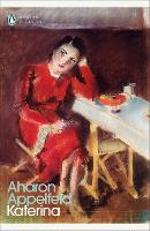A story of the Jews in Eastern Europe in the 19th century through the eyes of a gentile peasant girl, from one of the greatest writers of Holocaust fiction The teenage Katerina flees her abusive home in a poor, Christian village in the 1880s, finding work and shelter in the home of a Jewish family, and in the warmth of their family life and beauty of their Jewish rituals she begins to know safety for the first time. Their life is brutally disrupted when a pogrom is wrought upon the family, and Katerina finds herself alone again. Decades later, having suffered and retaliated for that suffering, she looks out of the window of her prison cell and sees the trains carrying Jews across Europe. Released from prison into the chaos following the end of World War II, a now elderly Katerina is devastated to find a world that has been emptied of its Jews and that is not at all sorry to see them gone. Ever the outsider, Katerina realizes that she has survived only to bear witness to the fact that they had ever existed at all. A rare glimpse into Jewish and gentile life in Eastern Europe in the nineteenth century, Katerina explores the long origins of the Holocaust, alongside darkness and light, cruelty and mercy.

Katerina
ISBN: 9780241681190
Format: Paperback
Publisher: Penguin (UBD)
Origin: GB
Release Date: November, 2024


